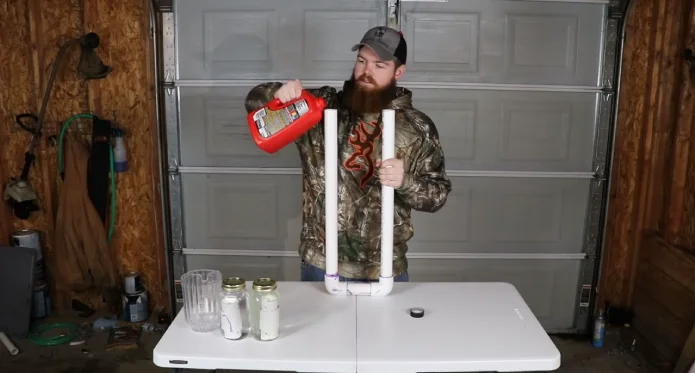Last Updated on October 18, 2023
You’ve probably considered using a drain cleaner when you’ve got a clogged pipe or drain. But does drain cleaner damage PVC pipes? The truth is that some drain cleaners can be detrimental to PVC pipes.
Drain cleaners with oxidizers, acids, caustics, esters, ketones, ethers, and aromatics can melt or soften PVC pipes.
Fortunately, there are alternatives such as enzyme and bacteria-based cleaners that won’t harm your PVC pipes.
We’ll discuss which chemicals degrade PVC pipe and which cleaners are safe for PVC pipe in more detail so you can choose the best product for your needs without risking further deterioration. You’ll also learn how to clean drains without hurting your pipes.
Does Drain Cleaner Damage PVC Pipes: Which Chemicals
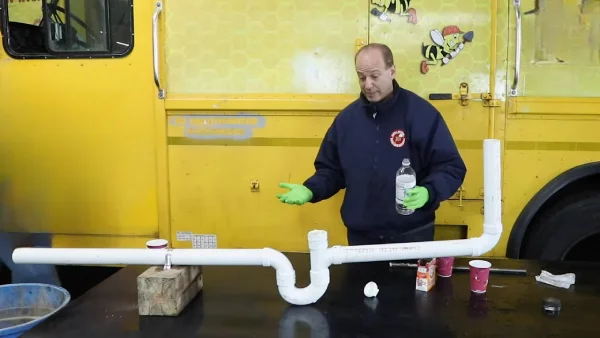
Chemicals that can break down PVC pipes in your drain system are those that are esters, ketones, ethers, aromatic or chlorinated hydrocarbons, oxidizers, acids, and caustics.
These chemicals react with the plastic material used in PVC pipe production to soften it up and make it more pliable.
This can lead to reduced tensile strength and an overall weakening of the pipe structure, which can cause issues like cracking or leaking.
Esters and ketones react with PVC because they are reactive molecules that contain a double bond between two carbons. There’s also a bond between two carbons in others, but they’re less reactive than esters or ketones.
Aromatic hydrocarbons contain a ring of carbon atoms that react with the plastic material in PVC pipes, causing them to become soft and weak. Finally, chlorinated hydrocarbons are highly reactive chemicals that have been linked to environmental degradation due to their toxicity when released into aquatic habitats.
Oxidizers such as chlorine bleach or sulfuric acid corrode the material in PVC pipes leading to its breakdown and dissolution over time.
What Drain Cleaner Is Safe for PVC Pipes?
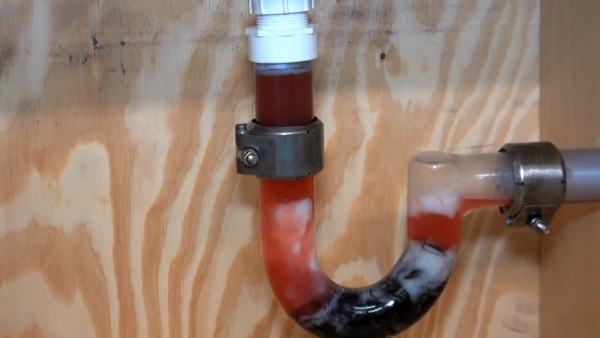
There are several alternatives available to find safe drain cleaners for use on PVC pipes.
Enzyme-based cleaners use bacteria and enzymes to break down organic matter within the pipes without damaging them chemically. This makes them safe for both residential and commercial applications where long-term durability is desired.
Bacteria-based cleaners also offer an additional layer of protection as they work slowly, eating away at buildup without releasing harmful chemicals into your home’s plumbing system.
Commercial products like Drano / Liquid Plumber (made from sodium hydroxide) will not degrade PVC pipes either, although you should use caution when using them as they still contain harsh ingredients that could be dangerous if mishandled/inhaled/used incorrectly by untrained personnel.
Also, these products should never be used near metal surfaces as they may cause corrosion over time due to their acidic properties.
Other options include chemical-free drain cleaning solutions such as baking soda combined with water. This acts similarly to the enzyme and bacteria-based cleaners but without introducing harsh chemicals to your pipes.
Just remember that this process needs to be repeated quite often for it to be effective since baking soda does not actively decompose organic matter in drains themselves as enzyme-based solutions do.
How Do You Clean Drains Without Damaging PVC Pipes?
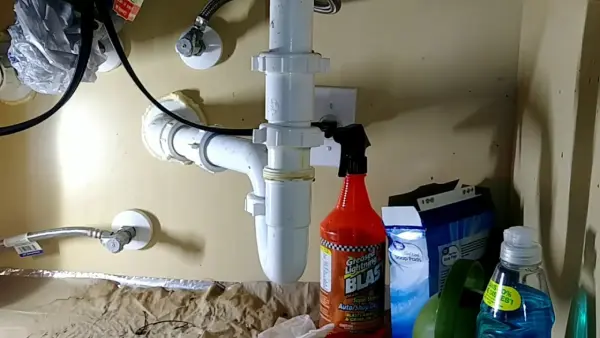
There are several methods to unclog drains without damaging PVC pipes, such as using a plunger, warm water and dish soap, baking soda and vinegar mixture, plumbers snakes, or even using an enzyme and bacteria-based cleaner. Here’s how to do each method safely.
1. Plunger Method
The plunger method is an effective solution to clean a drain without damaging PVC pipes. To begin, it is important to ensure that any debris around the drain is removed before proceeding.
Then, carefully place the plunger over the drain’s opening so that it covers the entire surface area. Put firm pressure on the plunger and make sure it creates a vacuum seal around the opening.
Quickly push and pull the plunger in short bursts for about 30 seconds to generate suction and loosen any blockage inside of the pipe. Once done, remove the plunger and check for success; if necessary, repeat these steps until fully unclogged.
2. Warm Water and Dish Soap Method
A useful technique for cleaning drains without damaging PVC pipes is to use warm water combined with a dish soap solution. Make warm water with a water heater. Start by pouring warm water down your drain, followed by a few tablespoons of liquid dish soap mixed with some hot water.
Allow this solution to sit in your drain for at least 20 minutes before flushing with more hot water to clear out any remaining blockage.
3. Baking Soda and Vinegar Mixture
Another way to clean drains without damaging PVC involves creating a foaming mixture of baking soda and vinegar. Equal parts of each should be used as this will help create an effective cleaning agent that can break up stubborn blockages in your pipes.
Pour this into your clogged drain, and allow it to remain there for at least 10 minutes before flushing out with hot water or using a plunger if needed for further assistance in clearing out any additional debris or build-up from within your pipe system.
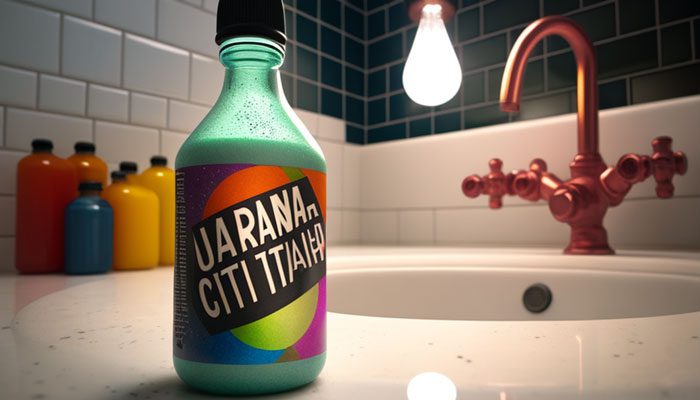
4. Using Plumbers Snakes
If you find yourself dealing with a persistent clog that won’t budge, plumber’s snakes are a great tool for removing blockages from drains without damaging PVC pipes in the process.
Place the tip of the drain snake into the drain until you feel resistance from hitting an obstruction, then rotate it back and forth until you’ve broken up whatever was blocking it before pulling out any debris present in the pipe itself.
After that, flush out any remaining residue from inside your pipe with hot water for the best results.
5. Use Safe Enzyme and Bacteria-based Cleaner
You can get rid of clogs with enzyme-based cleaners specifically made for PVC pipes if you can’t use plungers or baking soda solutions. These cleaners don’t ruin your plumbing since they’re designed for PVC pipes.
You need to read through all the instructions before you pour the product into your blocked drain and follow it up with some warm water.
Let the enzymes break down organics in your pipes naturally for a few minutes before flushing everything away completely with cold water after it’s done working its magic inside your drainage system.
Will Muriatic Acid Eat PVC?
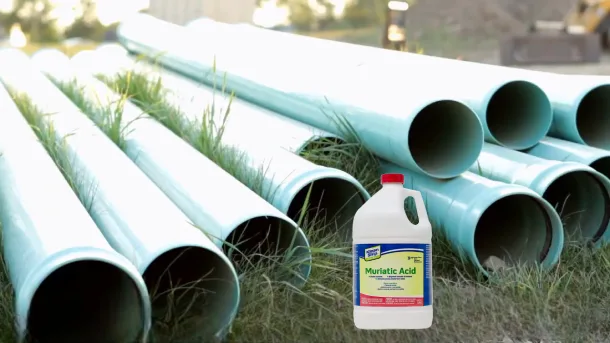
Muriatic acid may cause deterioration to PVC pipes and other drain lines if misused. It is a powerful chemical that should not be used for monthly maintenance due to its aggressive nature.
When using muriatic acid, it is important to take necessary safety precautions as it is potentially dangerous and corrosive if not used properly.
It can cause discoloration and cracking in the pipes over time, resulting in costly repairs. Improper use of muriatic acid may also ruin the adhesive that holds the pipe fittings together, making them weaker and more prone to leakage or breakage.
Is Vinegar Corrosive to PVC?
Vinegar is a weak acid and, therefore, can be used in small doses without damaging PVC pipes, which are plastic polyvinyl chloride pipes. These types of pipes are commonly found in the plumbing of residential homes.
While vinegar won’t corrode or eat away at PVC, it may lead to some discoloration if left on the pipes for extended periods of time. Even so, any discoloration will be superficial and will not affect the pipes’ functionality.
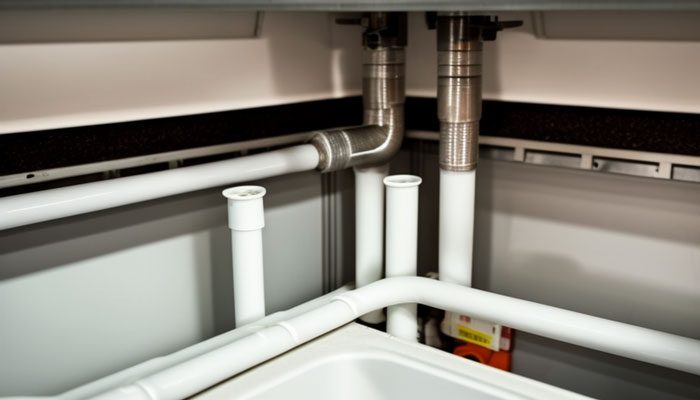
When using vinegar for cleaning purposes, it is best to dilute it with an equal part of water so that it does not harm your plumbing system and so that you do not end up with a lingering smell in your house.
Does Bleach Damage PVC Pipes?
While bleach does have many benefits as a powerful cleaner and sanitizer, it should not be used for drain lines made from PVC or ABS plastic. This is because chlorine bleach can quickly corrode these types of materials and cause them to break down over time.
The glue and cement joining these kinds of pipe fittings can also be affected by bleach, causing them to deteriorate faster than they would otherwise normally do without being exposed to the chemical agent.
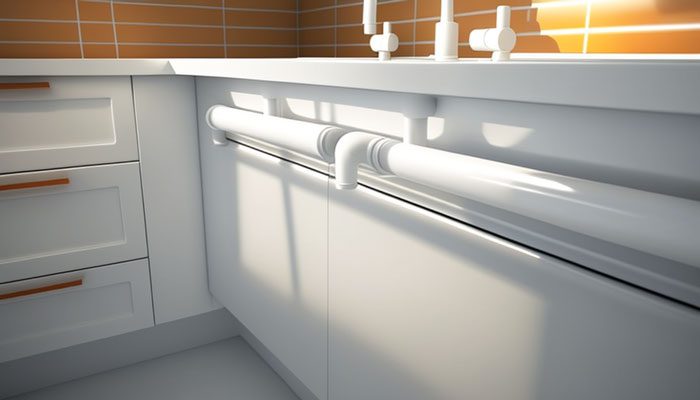
As such, it is important to take special care when using bleach around these types of materials, as doing so can lead to costly repairs or replacements later on down the line.
What Happens If You Use Too Much Drain Cleaner?
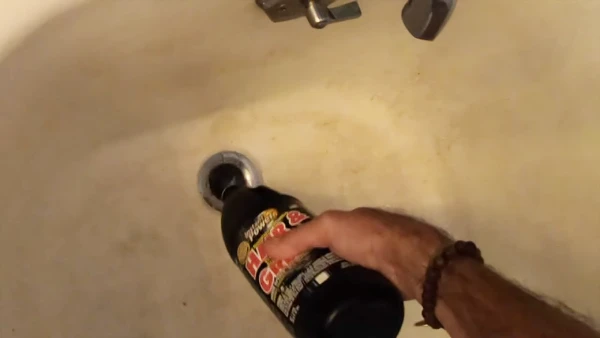
Using too much liquid drain cleaner can have severe consequences on your pipes. This is due to the corrosive nature of drain cleaners, which can cause significant destruction to your pipes.
In some cases, mixing different types of drain cleaners together can create chemical reactions that produce heat and toxic gases that are dangerous to both people and the environment. The long-term use of excessive amounts of chemical drain cleaner can even lead to complete pipe failure, leaving you with costly repairs or replacements.
How Long Does Drain Cleaner Stay In Pipes?
The effects of store-bought drain cleaners typically last for a week or less. These products are designed to break up blockages in drains quickly. But they are not intended for long-term use as they could cause irreversible destruction to your pipes if used excessively.
For best results, it is recommended that you limit the use of these products to once every one to two weeks to ensure that no harm is done to your drains and pipes.
It is important to follow the packaging directions carefully to avoid using too much product at once and causing potential damage.
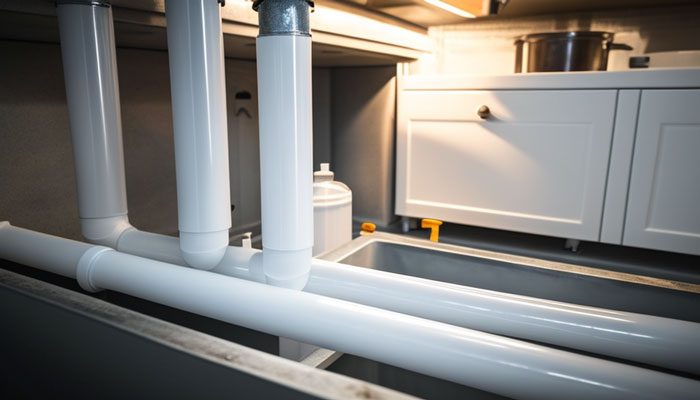
Avoid Using Hazardous Drain Cleaners and Opt for Safer Alternatives
Be mindful of the type of drain cleaner you use. Certain products can be disastrous for PVC pipes in your home, so don’t let them meet their untimely demise.
You should avoid oxidizers, acids, caustics, and other chemicals, while enzyme-based cleaners are a safer alternative.
Assuring that you use the best drain cleaner for the job is key when it comes to keeping your plumbing system running smoothly for ages. Taking the time now to ensure that you’re using the right drain cleaner will save you from having costly repairs down the line.

